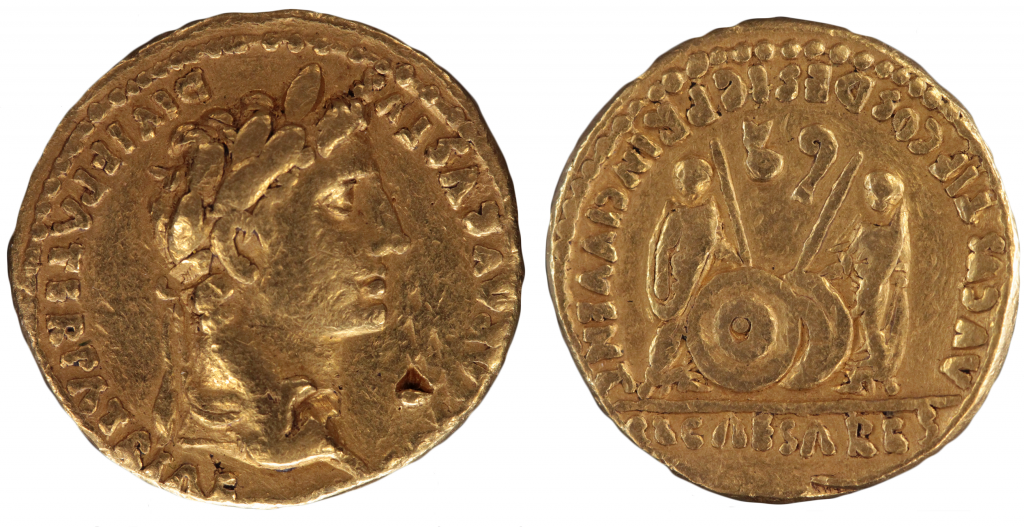August 19, 2015, by Will Leveritt
On this day in AD14 Rome’s first emperor, Augustus, died aged 76 (Part I)
Text by Mike Welbourn
Image © Mint Imperial
In this first part we look at Augustus’ rise to power. In the second part, we will look at his time as emperor.
Augustus had risen to power in the aftermath of the assassination in 44 BC of his great-uncle and adoptive father, the dictator Julius Caesar. In concert with Marc Antony, who had been a loyal lieutenant of the dead dictator, he defeated Brutus and Cassius, the leading conspirators, at the Battle of Philippi in 42.

AU aureus of Augustus. Ob. has laureate head of emperor right, [CA]ESAR AVGVSVS DIVI F PATER PATRIAE. Rev. has Gaius and Lucius standing with spears and shields, simpulum and lituus above, AVGVSTI F COS DESIG PRINC IVVENT, CL CAESARES in ex. 7.45g, 18mm, 11 o’clock.
He now had to deal with the fallout from his victory and in particular the question of what role and position he was to have in the Roman state. In addition to retaining his position as triumvir, in 32, as relations with Antony deteriorated further, Octavian engineered the swearing of an oath of loyalty to himself as de facto protector of the state by the whole of the Italian peninsular.
However, Octavian was concerned to be seen as someone who honoured traditional Republican ideas and practices. He was also keenly aware of what had befallen Caesar when he had flaunted his dominance too openly. Therefore, at a meeting of the senate in mid-January of 27 BC, Octavian formally relinquished his powerful position and made a show of returning control of the state to the senate and people of Rome.
This had, of course, been carefully orchestrated beforehand and the senate’s pre-determined response was to grant Octavian a new position which, by virtue of being conferred officially, could be presented as constitutional. Under this dispensation, Octavian was awarded control of the bulk of Rome’s militarized provinces for ten years (control which, in the event, was to be renewed at regular intervals). The non-militarized provinces were, theoretically to be retained by the senate. At a stroke Octavian – who was also now awarded the name Augustus, which means something like ‘revered’ or ‘sanctified’ – had been made military despot of Rome. His domestic powers were provided via his annual election as one of Rome’s two consuls.
In 23 BC a new settlement was arranged. Augustus gave up his annual consulship and in return received the powers of a consul (consular imperium) without the need to occupy the office itself. He also received the tribunicia potestas, the powers of a plebeian tribune. As well as conferring various actual rights, this had a useful symbolism since plebeian tribunes had historically been officials who defended the rights of ordinary Romans; Augustus’ position thus took on a popular and populist aspect.
Lastly, in 19 BC his consular imperium was, as it were, upgraded, to become imperium maius (“greater” imperium); this meant that his consular authority was greater than that of other governors of consular rank, which gave a formal basis to his right to intervene in the notionally senatorial provinces. This was the package of powers which all his successors would be granted when they became emperor.
No comments yet, fill out a comment to be the first

Leave a Reply